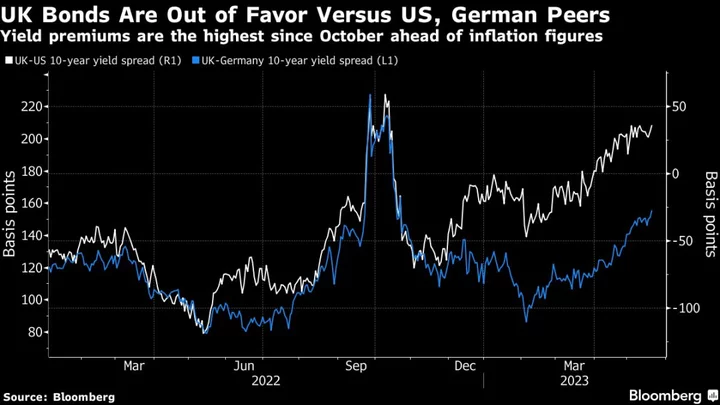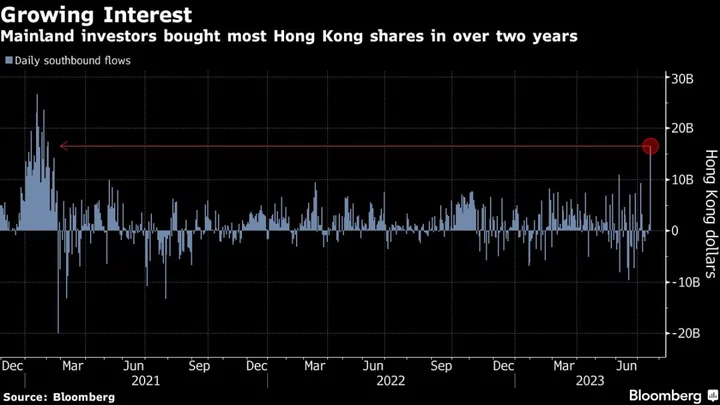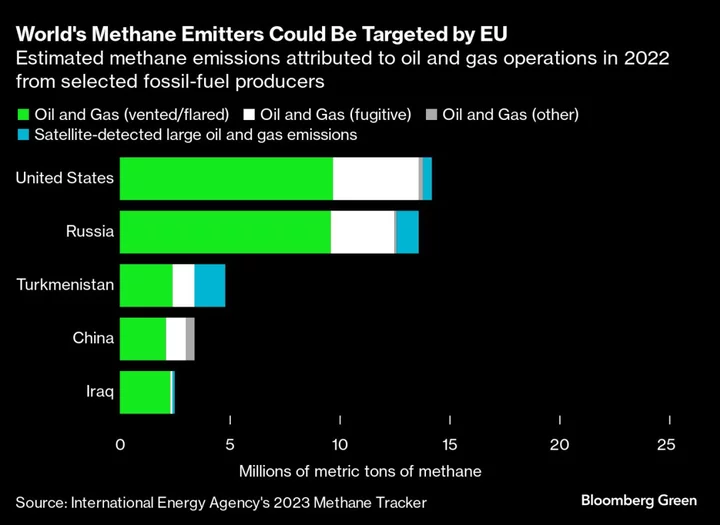Britain’s labor market tightened unexpected in April, as wages shot up and unemployment fell, in another sign that the Bank of England hasn’t yet done enough to bring down stubbornly high inflation.
The unemployment rate dropped to 3.8% in the three months through April, defying forecasts for an increase to 4%, the Office for National Statistics said Tuesday. Average earnings increases excluding bonuses rose to the highest ever outside the pandemic.
Gilts fell as traders priced in further interest-rate hikes for the BOE. The yield on two-year notes jumped as much as 8 basis points to 4.72%, edging towards highs last seen during the global financial crisis in 2008.
The market sees the bank raising borrowing costs by almost 120 basis points, taking the key rate to about 5.7% by February 2024. Sterling traded 0.5% stronger at $1.2566 as of 8:09 a.m. in London.
The figures are a major surprise because economists and the Bank of England had been expecting the labor market to loosen under the pressure of 12 consecutive interest rate increases.
While surveys have shown wage growth remaining strong, the central bank was looking at a slowdown in new job vacancies as an indicator that the jobs market was cooling. Instead, a persistent shortage of workers, many of whom dropped out of the workforce in the pandemic, is driving up wages.
“The UK labor market remains very tight and continues to confound expectations,” said Hussain Mehdi, Macro & Investment Strategist at HSBC Asset Management. “For the Bank of England, wage growth is a big problem – it is simply at too high a level to allow inflation to hit the 2% target.”
The number of people in employment rose to a record 33.1 million during the quarter, surpassing pre-pandemic levels for the first time. All other Group of Seven nations reached that milestone months before the UK. British companies are scrambling to find the staff they need, bidding up pay and bringing down the unemployment rate.
Joblessness fell by 25,000 in the quarter through April compared with the three months through March. The number of people classed as inactive — out of work and not looking for a job — fell by 13,000. That contributed to a 94,000 jump in the number of people in employment.
“Fierce competition for skills, wage demands and candidates’ expectations leave many businesses with job vacancies they can’t fill,” said Jane Gratton, head of people policy at the British Chambers of Commerce. “Together with broader inflationary pressures, it’s a perilous environment for business.”
What Bloomberg Economics Says ...
“Both wage and price pressures are proving stronger than the central bank expected in its May forecast, meaning there is little to prevent the monetary policy committee from lifting rates in both June and August. That would mean a terminal rate of 5%, up from our previous forecast of 4.75%.”
—Ana Andrade, Bloomberg Economics. Click for the REACT.
The wage data echoes findings of the Bloomberg Reed Jobs report, published in collaboration with Reed Recruitment. It found wages across new positions offered in the three months to April were up 10% year-on-year, adding to inflationary pressures.
Pay is still rising more slowly than inflation, eating into the spending power of consumers and delivering the tightest cost-of-living squeeze in generations. Chancellor of the Exchequer Jeremy Hunt has vowed to fight those pressures.
“Rising prices are continuing to eat into people’s pay checks – so we must stick to our plan to halve inflation this year to boost living standards,” Hunt said in a statement.
Soaring prices have squeezed household living standards. Real wages adjusting for inflation are still 1.3% lower than a year earlier. That has led to the worst period of industrial strife since the late 1980s.
The number of employees on payroll rose 22,879 in May, and the large drop in April reported last month was revised away. Payrolls in that month are now estimated to have risen by 6,822.
“The large fall in the payrolled employees number led us all to believe the labor market was finally turning, but it turns out the figures were way out,” said Stuart Cole, chief macro economist at Equiti Capital in London. “If you are a member of the MPC you will likely be pulling your hair out, wondering how you can be expected to steer monetary policy when faced with revisions such as this.”
Investors expect the BOE to keep hiking rates through the summer, starting with a quarter-point increase to 4.75% on June 22. That would be the highest rate since the start of the global financial crisis more than a decade ago.
“Most central banks have a mandate to stabilize inflation with either an explicit or implicit mandate to maintain employment,” said Rishi Mishra, an analyst at Futures First. “If inflation and employment both remain strong, there are no trade-offs. Policy has but one direction to move and that’s higher.”
Wage growth in April was boosted by a 9.7% increase in the national minimum wage, which was aimed at cushioning the lowest-paid workers from a surge in food and energy prices.
Overall, pay growth excluding bonuses accelerated to 7.2%, the highest ever recorded outside the pandemic. In the private sector, pay is growing by 7.6%, also a record aside from the period distorted by Covid lockdowns.
The ONS said 257,000 working days were lost due to strike action in April, a month that saw civil servants including passport workers and junior doctors continue their campaign for better pay.
It took the total days lost since the start of last year to almost 3.9 million, the most since 1989-90 when the country was in the grip of unrest in the dying days of Margaret Thatcher’s premiership.
The number of people in work and the number of hours worked passed pre-pandemic levels for the first time, hitting new highs. The UK had been the only Group of Seven nation where employment and hours had not fully recovered.
The number of vacancies slipped to 1.05 million in March to May from 1.09 million in February to April. But this number is still around 25% higher than pre-pandemic levels.
The redundancy rate has been largely unmoved over the past three months. Employers have said they will hang on to staff given the difficulties they have faced with recruitment.
The number of inactive who are long-term sick hit a new record high of 442,278.
--With assistance from Elina Ganatra, Eamon Akil Farhat, James Hirai and Aline Oyamada.
(Updates market reaction and adds comment.)









